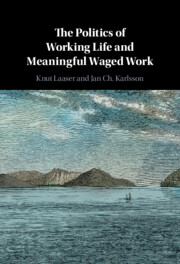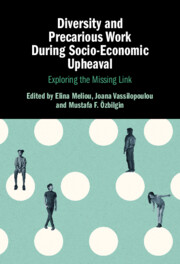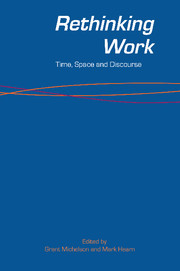The Politics of Working Life and Meaningful Waged Work
Can waged work under capitalism be meaningful? How does this meaningfulness express itself in the politics of working life? More fundamentally, how should work be socially and economically valued, rewarded, organised and regulated to become more meaningful? Knut Laaser and Jan Ch. Karlsson address these questions and provide a novel theory of meaningful work that is deeply ingrained in Critical Social Science approaches. The authors conceptualise meaningful work as a continuum between meaningful–meaningless work that rests on objective and subjective dimensions of autonomy, dignity and recognition, all pushed and pulled by the multi-layered control and power dynamics of waged work. They challenge the tendency to promote unpolitical concepts in the scholarship of meaningful work. The explanatory power of the meaningful work framework is illustrated by the analysis of empirical case studies on Norwegian industry operators, British bank employees, Indian security guards, German university academics and Swedish cabin crew members.
- Features interdisciplinary perspectives from sociology, psychology and philosophy to capture the complexity of the enablers and constraints of waged work as a source of meaning
- Promotes and celebrates the importance of work for people and society, showcasing the different shapes and forms meaningful work can take as well as highlighting the dangers of precarious and standardized work that undermines horizontal working relationships
- Offers important insights for interventions by scholars, policy makers and unions to improve working life in the 21st century
Reviews & endorsements
‘Sociologists have a love–hate relationship with waged work. On the one hand, they love researching it; on the other hand, they too readily claim that this work is hateful because it lacks meaning. In this ground-breaking new book, Knut Laaser and Jan Ch. Karlsson seek to redress this imbalance, arguing, with supportive evidence, that meaning ought to be a central tenet in any theory of waged work.’ Chris Warhurst, Warwick Institute for Employment Research
‘Meaningful work is at the frontier of job design and social progress, but its potential has been neglected by sociologists of work. Laaser and Karlsson translate recent theoretical developments into a critical framework - for empirical inquiry, and practical application in private and public organisations. Their approach is convincing and successful, providing academics and practitioners with new tools for realising meaningfulness in the experience and structure of all kinds of work. Highly recommended.’ Ruth Yeoman, Fellow, Kellogg College, University of Oxford
‘Work has become central to public discourse. Laaser and Karlsson provide an innovative and insightful mapping of issues that will prove a valuable resource for anyone interested in this topical but contested terrain.’ Paul Thompson, Emeritus Professor of Employment Studies, University of Stirling
Product details
November 2023Hardback
9781009098571
250 pages
235 × 160 × 25 mm
0.65kg
Available
Table of Contents
- Preface
- 1. Meaningful work
- Part I. Problems in Analyses of Meaningful Work:
- 2. Contradictions in the concept of work
- 3. The ideological meaning of exploitative work forms
- 4. The politics of working life
- Part II. Theoretical Traditions in Analysing Meaningful Waged Work:
- 5. Approaching the meaning of waged work through its meaninglessness
- 6. Designing, organising and managing meaningful waged work
- 7. Meaningful wage labour as a human condition: humanist accounts of meaningful waged work
- 8. The political philosophy of meaningful wage labour
- Part III. Meaningful and Meaningless Waged Work:
- 9. Objective and subjective dimensions of meaningful waged work: towards a new meaningful work framework
- 10. Theorizing meaningful and meaningless waged work
- 11. Conclusion: meaningful waged work and its implications for the critical analysis of work and employment
- References
- Index.




